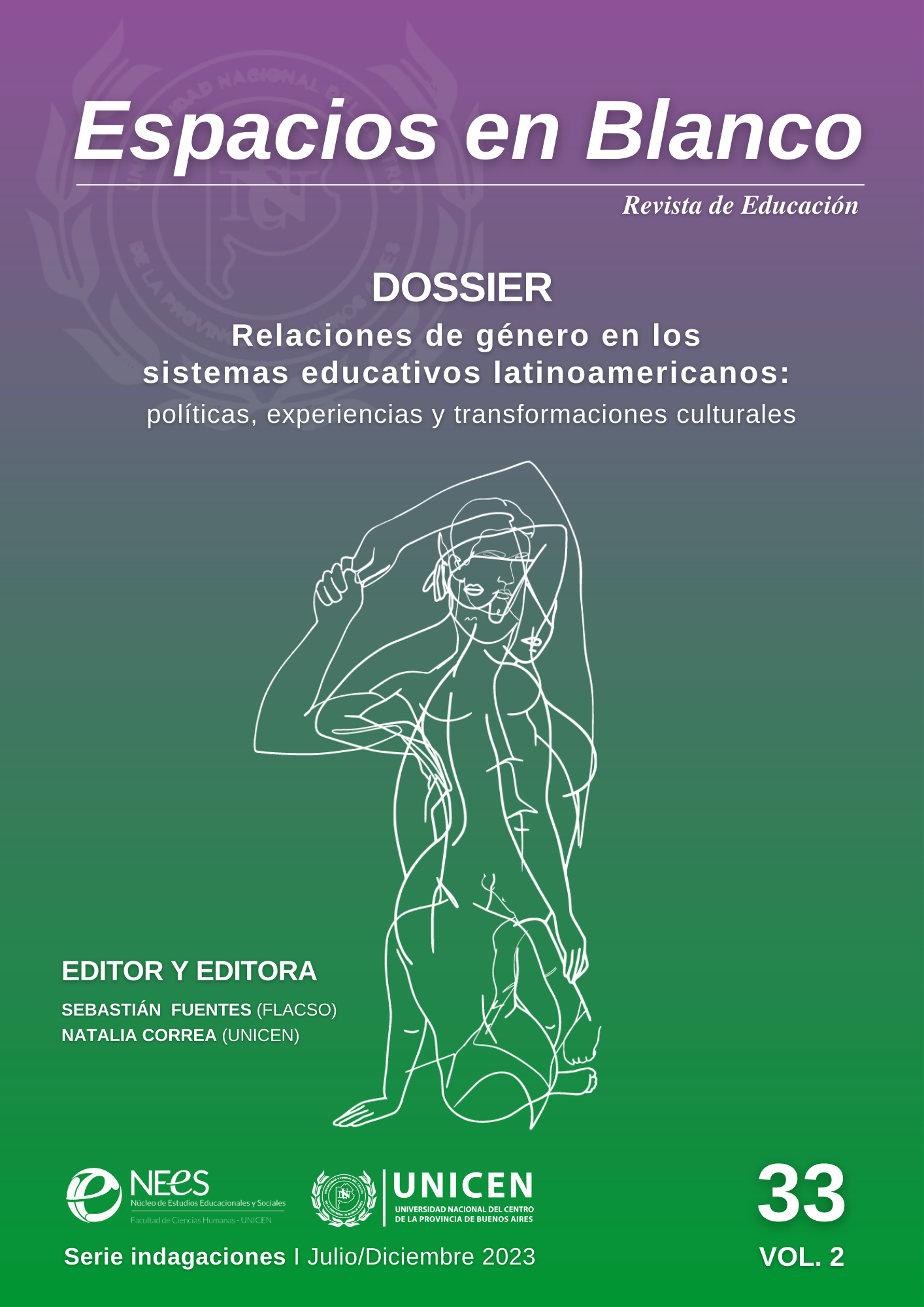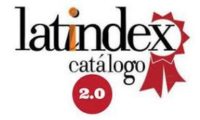Pensando con otros:
un enfoque dialógico-reflexivo en la práctica profesional de la formación inicial docente
DOI:
https://doi.org/10.37177/UNICEN/EB33-370Palabras clave:
formación inicial docente, reflexión pedagógica, educación dialógica, argumentación, tríadaResumen
En educación, se ha virado hacia un proceso centrado en el estudiante, implicando desafíos para la formación docente; entre otros, formar profesionales reflexivos. En la presente discusión abordamos esta problemática, explicitando qué entendemos por reflexión, qué habilidades presupone y cuál es el rol del lenguaje, para lo cual articulamos un continuo epistemológico para entender la naturaleza del conocimiento pedagógico. Basándonos en el paradigma socio-constructivo, que enfatiza los factores contextuales e interaccionales, se discute una propuesta hacia la práctica profesional, que es donde se confronta la formación académica y el ejercicio profesional. Creemos que el saber debe visualizarse como un continuo entre teoría y práctica, mediante la explicitación de procesos cognitivos. Consecuentemente, proponemos la necesidad de un dispositivo construido situadamente que operacionalice ciertas habilidades, facilitando la práctica pedagógica reflexiva a los distintos actores del proceso formativo.
Citas
Alexander, R. (2008). Towards dialogic teaching: rethinking classroom talk. York, UK: Dialogos.
Argyris, C. (2002). Double-loop learning, teaching, and research. Academy of management learning and education, 1 (2), 206-218.
Ávalos, B. (2002). Profesores para Chile, historia de un proyecto. Santiago, Chile: Ministerio de Educación.
Baker, M. (2009). Argumentative interactions and the construction of social knowledge. En N. Mirza y A. Pierre-Clermont (Eds.), Argumentation and Education: Theoretical Foundations and Practices (pp. 127-144). Boston, MA: Springer. DOI: 10.1007/978-0-387-98125-3_5
Bates, A., Ramírez, L. y Drits, D. (2009). Connecting university supervision and critical reflection: mentoring and modelling, Teacher Educator, 44, 90-112.
Billig, M. (1996). Arguing and thinking: A rhetorical approach to social psychology. Cambridge, UK: Cambridge University Press. DOI: 10.2307/2074146
Branderburg, R. (2004). Roundtable reflections: (Re)defining the role of the teacher educator and the preservice teacher as ‘co-learners’. Australian Journal of Education, 48, 166-181.
Brandenburg, R., Glasswell, K., Jones, M. y Ryan, J. (2017). Reflective Theory and Practice in Teacher Education. Beach Road, Singapore: Springer Singapore. DOI: 10.1007/978-981-10-3431-2
Castells, M. (2009). Comunicación y poder. Madrid, España: Alianza.
Centro de Perfeccionamiento, Experimentación e Investigaciones Pedagógicas - CPEIP (2019). Informe resultados institucionales: Evaluación nacional diagnóstica de la formación inicial docente, Ministerio de Educación, Gobierno de Chile.
Chinn, C. y Brewer, W. (1998). An empirical test of a taxonomy to responses to anomalous data in science. Journal of Research in Science Teaching, 35, 623-654. DOI: 10.1002/(sici)1098-2736(199808)35:6<623::aid-tea3>3.3.co;2-k
Coll, C., Colomina, R., Onrubia, J. y Rochera, M. (1992). Actividad conjunta y habla: una aproximación al estudio de los mecanismos de influencia educativa. Infancia y Aprendizaje, 59-60, 189-232.
Colomina, R., Mayordomo, R. y Onrubia, J. (2001). El análisis de la actividad discursiva en la interacción educativa. Algunas opciones teóricas y metodológicas. Infancia y aprendizaje, 24, 67-80. DOI: 10.1174/021037001316899929
Cornejo, J. (2003). El pensamiento reflexivo entre profesores. Pensamiento educativo, 32, 343-373.
Cussins, A. (1992). Content, embodiment and objectivity: The theory of cognitive trails. Mind, 101 (404), 651-688.
Dewey, J. (1910). How we think. Boston, UK: D.C. Heath & Company, Publishers.
Dewey, J. (1938). Logic-The theory of inquiry. New York, USA: Henry Holt and Company.
Dewey, J. (2004). Experiencia y educación. Madrid, España: Biblioteca Nueva.
Erduran, S. y García-Mila, M. (2015). Epistemic practices and thinking in science: Fostering teachers' development in scientific argumentation. En R. Wegerif, L. Li, & J. Kaufman, (Eds.) The Routledge International Handbook of research on teaching thinking (pp. 388-401), UK, London: Taylor & Francis.
Felton, M., Crowell, A. y Liu, T. (2015). Arguing to agree: mitigating my-side bias through consensusseeking dialogue. Written Communication, 32, 317-331. DOI: 10.1177/0741088315590788.
Felton, M., García-Mila, M. y Gilabert, S. (2009). Deliberation versus dispute: The impact of argumentative discourse goals on learning and reasoning in the science classroom. Informal Logic, 29, 417-446. DOI: 10.22329/il.v29i4.2907
Felton, M., García-Mila, M., Villarroel, C. y Gilabert, S. (2015). Arguing Collaboratively: Argumentative discourse types and their potential for knowledge building. British Journal of Educational Psychology, 85 (3), 372-386.
Fisher, P. & Greitemeyer, T. (2010). A new look at selective-Exposure Effects: An integrative Model. Current Directions in Psychological Science, 19, 384-389.
Frantz, C. M. (2006). I AM Being Fair: The Bias Blind Spot as a Stumbling Block to Seeing Both Sides. Basic and Applied Social Psychology, 28 (2), 157-167.
Freire, P. (2014). Miedo y Osadía. La cotidianidad del docente que se arriesga a practicar una pedagogía transformadora-Paulo Freire e Ira Shor. Buenos Aires, Argentina: Siglo XXI Editores.
Freire, P. (2015). Pedagogía del oprimido. Buenos Aires, Argentina: Siglo XXI Editores.
Fuentealba, R. y Russell, T. (2020). Telling is not teaching, listening is not learning: new teacher education practices from a critical friendship. En C. Edge, A. Cameron-Standerford, & B. Bergh (Rds.), Textiles and Tapestries: self-study for envisioning new ways of knowing. EdTech Books. https://edtechbooks.org/textiles_tapestries_self_study
Greeno, J. (2012). Concepts in activities and discourse. Mind, Culture and Activity, 19 (3), 310-313. DOI: 10.1080/10749039.2012.691934
Greeno, J. y Egeström, Y. (2013). Learning in activity. En R. K. Sawyer (Ed.), The Cambridge Handbook of the Learning Sciences (2da Ed.). Cambridge University Press.
Guerra, P. (2009). Revisión de experiencia de reflexión en la formación inicial de docentes. Estudios Pedagógicos, 35 (2), 243-260.
Guzmán, V. y Larraín, A. (2021). The transformation of pedagogical practices into dialogic teaching: towards a dialogic notion of teacher learning. Professional Development in Education, 1-14. DOI: 10.1080/19415257.2021.1902837
Harrison, J., Lawson, T. y Wortley, A. (2005). Facilitating the professional learnings of new teachers through critical reflection on practice during mentoring meetings. European Journal of Teacher Education, 28, 267-292.
Hébert, C. (2015). Knowing and/or experiencing: A critical examination of the reflective models of John Dewey and Donald Schön. Reflective Practice, 16, 361-371.
Kaddouri, M. y Vandroz, D. (2008). Formation professionnelle en alternance: quelques tensions d’ordre pédagogique et identitaire. En Vers une conceptualisation de la situation de stage: explorations
internationales, (pp.23-42). Sherbrooke, Canadá: Éditions du CRP.
Kessels, J. y Korthagen, F. (1996). The Relationship Between Theory and Practice: Back to the Classics. Educational Research, 25 (3), 17-22.
Klayman, J. (1995). Varieties of confirmation bias. Psychology of learning and motivation, 32, 385-418.
Kuhn, D. y Lao, J. (1996). Effects of evidence on attitudes: Is polarization the norm? Psychological Science, 7, 115-120.
Lara Subiabre, B. (2019). Reflexión Pedagógica de Profesores en Formación. Un estudio de cuatro universidades chilenas. Perspectiva Educacional, 58 (1), 4-25. DOI: 10.4151/07189729-Vol.58-Iss.1-Art.802
Larraín, A., Moreno, C., Grau, V., Freire, P., Salvat, I., López, P. & Silva, M. (2017). Curriculum materials support teachers in the promotion of argumentation in science teaching: A case study. Teaching and Teacher Education, 67, 522-537.
Lord, C. y Taylor, C. (2009). Biased assimilation: Effects of assumptions and expectations on the interpretation of new evidence. Social and Personality Psychology Compass, 3, 827-841.
Mercer, N. (2002). Words and minds: How we use language to think together. Londres, UK: Routledge. DOI: 10.4324/9780203464984
Mercier, H. y Sperber, D. (2011). Why do humans reason? Arguments for an argumentative theory. Behavioral and brain sciences, 34, 57-74. DOI: 10.1017/s0140525x10000968
Michaels, S. y O’Connor, C. (2015). Conceptualizing talk moves as tools: Professional development approaches for academically productive discussion. Socializing intelligence through talk and dialogue (pp. 347-362).Washington D. C., United States: American Educational Research Association.
Ministerio de Educación, Centro de Perfeccionamiento, Experimentación e Investigaciones Pedagógicas (CPEIP) (2021). Marco para la buena enseñanza. Gobierno de Chile.
Newstead, S., Girotto, V. y Legrenzi, P. (1995). The THOG problem and its implications for human reasoning. En Perspectives on thinking and reasoning: essays in honour of Peter Wason. Publisher Hove, UK; Hillsdale: Lawrence Erlbaum Associates.
Nickerson, R. (1998). Confirmation Bias: A ubiquitous phenomenon in many guises. Review of General Psychology, 2, 175-220.
Pastré, P., Mayen, P. y Vergnaud, G. (2006). La didactique professionnelle. Revue française de pédagogie, 154, 145-198. DOI:10.4000/rfp.157.
Pinedo-González, R., Cañas-Encinas, M., García-Martín, N. y García-González, N. (2019). Capacidad metacognitiva en docentes y futuros docentes de enseñanza no universitaria. Revista de Psicología y Educación, 14 (1), 74-86. DOI: 10.23923/rpye2019.01.173
Raelin, J. A. (2007). Toward an epistemology of practice. Academy of management learning & education, 6, 495-519.
Reznitskaya, A. y Wilkinson, A. (2019). Designing professional development to support teachers’ facilitation of argumentation. En N. Mercer, R. Wegerif y L. Major (Eds.). The Routledge International Handbook of Research on Dialogic Education (pp. 254- 268). Routledge. DOI:10.4324/9780429441677.
Ritchhart R., Church, M. y Morrison, K. (2014). Hacer visible el pensamiento. Cómo promover el compromiso, la comprensión y la autonomía de los estudiantes. Buenos Aires, Argentina: Paidós.
Robbins, P. y Aydede, M. (2009). A short primer on situated cognition. The Cambridge Handbook of Situated Cognition. (Cambridge Handbooks in Psychology). Cambridge, UK: Cambridge University Press. DOI:10.1017/CBO9780511816826
Romero-Jeldres, M. y Maturana-Castillo, D. (2011). La supervisión de prácticas pedagógicas: ¿cómo fortalecer la tríada formativa? Revista Internacional de Educación, 4, 653-667.
Russell, T. (2012). Cambios paradigmáticos en la formación de profesores: peligros, trampas y la promesa no cumplida del profesional reflexivo. Encounters in Theory and History of Education, 13, 71-91.
Russell, T. (2014). La práctica en la formación de profesores: tensiones y posibilidades en la experiencia de aprender a enseñar. Estudios Pedagógicos, XL (1), 223-238.
Russell, T. y Martin, A. K. (2017). Teacher education needs an epistemology of practice. In J. Mena et al. (Eds.), Search and research: Teacher education for contemporary contexts (pp. 111-118). Salamanca, España: Ediciones Universidad Salamanca.
Sanzana, G. (2013). La práctica de aula, un espacio de reflexión sobre la relación pedagógica. En O. Nail (coord.). Análisis de Incidentes críticos de aula (pp. 121-137). Concepción, Chile: RIL Editores.
Scharwz, B. y Baker, M. (2017). Dialogue, argumentation and education: History, theory and practice. Cambridge, UK: Cambridge University Press.
Schön, D. (1983). The Reflective Practitioner. How Professionals Think in Action. New York, USA: Basic Books.
Schön, D. (1987). Educating the Reflective Practitioner. Toward a New Design for Teaching and Learning in the Professions. San Francisco, CA: Jossey-Bass Inc.
Schön, D. A. and Rein, M. (1994). Frame reflection: Toward the resolution of intractable policy controversies. New York, USA: Basic Books.
Van Manen, M. (1995) On the Epistemology of Reflective Practice. Teachers and Teaching, 33-50. DOI: 10.1080/1354060950010104
Van Manen, M. (1998). El tacto en la enseñanza. El significado de la sensibilidad pedagógica. Ediciones Paidós Ibérica.
Vanegas, C. y Fuentealba, R. (2018). Triadic thoughtful table: Space to generate reflective thoughts during initial training teaching practices. International Journal of Advancement in Engineering Technology, Management and Applied Science, 4, 19-34.
Vygotsky, L. (1978). Mind and society. From a social constructivist perspective. Cambridge, MA: Harvard University Press.
Walton, D. (1989). Informal logic: A handbook for critical argument. Cambridge, UK: Cambridge University Press.
Zeichner, K. & Liston, D. (1987). Teaching Student Teachers to Reflect. Harvard Educational Review, 56 (1), 23-48.



















